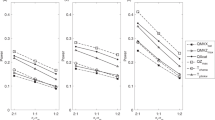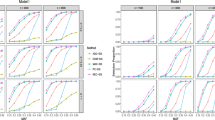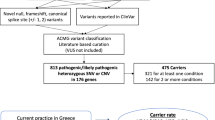Abstract
The analysis of genome-wide genetic association studies generally starts with univariate statistical tests of each single-nucleotide polymorphism. The standard approach is the Cochran-Armitage trend test or its logistic regression equivalent although this approach can lose considerable power if the underlying genetic model is not additive. An alternative is the MAX test, which is robust against the three basic modes of inheritance. Here, the asymptotic distribution of the MAX test is derived using the generalized linear model together with the Delta method and multiple contrasts. The approach is applicable to binary, quantitative, and survival traits. It may be used for unrelated individuals, family-based studies, and matched pairs. The approach provides point and interval effect estimates and allows selecting the most plausible genetic model using the minimum P-value. R code is provided. A Monte-Carlo simulation study shows that the asymptotic MAX test framework meets type I error levels well, has good power, and good model selection properties for minor allele frequencies ≥0.3. Pearson’s χ2-test is superior for lower minor allele frequencies with low frequencies for the rare homozygous genotype. In these cases, the model selection procedure should be used with caution. The use of the MAX test is illustrated by reanalyzing findings from seven genome-wide association studies including case–control, matched pairs, and quantitative trait data.
Similar content being viewed by others
Log in or create a free account to read this content
Gain free access to this article, as well as selected content from this journal and more on nature.com
or
References
Kuo CL, Feingold E : What’s the best statistic for a simple test of genetic association in a case-control study? Genet Epidemiol 2010; 34: 246–253.
Sasieni PD : From genotypes to genes: doubling the sample size. Biometrics 1997; 53: 1253–1261.
Li Q, Zheng G, Liang X, Yu K : Robust tests for single-marker analysis in case-control genetic association studies. Ann Hum Genet 2009; 73: 245–252.
Freidlin B, Zheng G, Li Z, Gastwirth JL : Trend tests for case-control studies of genetic markers: power, sample size and robustness. Hum Hered 2002; 53: 146–152.
González JR, Carrasco JL, Dudbridge F, Armengol L, Estivill X, Moreno V : Maximizing association statistics over genetic models. Genet Epidemiol 2008; 32: 246–254.
Joo J, Kwak M, Chen Z, Zheng G : Efficiency robust statistics for genetic linkage and association studies under genetic model uncertainty. Stat Med 2010; 29: 158–180.
Zang Y, Fung WK, Zheng G : Simple algorithms to calculate asymptotic null distributions of robust tests in case-control genetic association studies in R. J Stat Softw 2010; 33: 1–24.
Hothorn LA, Hothorn T : Order-restricted scores test for the evaluation of population-based case-control studies when the genetic model is unknown. Biom J 2009; 51: 659–669.
So HC, Sham PC : Robust association tests under different genetic models, allowing for binary or quantitative traits and covariates. Behav Genet 2011; 41: 768–775.
Zang Y, Fung WK : Robust Mantel-Haenszel test under genetic model uncertainty allowing for covariates in case-control association studies. Genet Epidemiol 2011; 35: 695–705.
Li Q, Zheng G, Li Z, Yu K : Efficient approximation of P-value of the maximum of correlated tests, with applications to genome-wide association studies. Ann Hum Genet 2008; 72: 397–406.
Zheng G, Chen Z, Li Z : Tests for candidate-gene association using case-parents design. Ann Hum Genet 2003; 67: 589–597.
Zheng G, Freidlin B, Gastwirth JL : Robust TDT-type candidate-gene association tests. Ann Hum Genet 2002; 66: 145–155.
Zang Y, Fung WK, Zheng G : Asymptotic powers for matched trend tests and robust matched trend tests in case-control genetic association studies. Comput Stat Data Anal 2010; 54: 65–77.
Zheng G, Tian X : Robust trend tests for genetic association using matched case-control design. Stat Med 2006; 25: 3160–3173.
Zang Y, Fung WK : Robust tests for matched case-control genetic association studies. BMC Genet 2010; 11: 91.
Zheng G, Joo J, Tian X et al: Robust genome-wide scans with genetic model selection using case-control design. Stat Interface 2009; 2: 145–151.
Ziegler A, König IR : A Statistical Approach to Genetic Epidemiology, Concepts and Applications 2nd edn. Weinheim: WILEY-VCH, 2010.
Minelli C, Thompson JR, Abrams KR, Thakkinstian A, Attia J : The choice of a genetic model in the meta-analysis of molecular association studies. Int J Epidemiol 2005; 34: 1319–1328.
Bagos PG : A unification of multivariate methods for meta-analysis of genetic association studies. Stat Appl Genet Mol Biol 2008; 7: 1544–6115., DOI: 10.2202/1544–6115.1408.
Cox DR : The role of significance tests. Scand J Statist 1977; 4: 49–70.
Cordell HJ, Clayton DG : A unified stepwise regression procedure for evaluating the relative effects of polymorphisms within a gene using case/control or family data: application to HLA in type 1 diabetes. Am J Hum Genet 2002; 70: 124–141.
Timmann C, Thye T, Vens M et al: Genome-wide association study indicates two novel resistance loci for severe malaria. Nature 2012; 489: 443–446.
Rao CR : Linear statistical interference and its applications 2nd edition New York: Wiley, 1973.
Strasser H, Weber C : On the asymptotic theory of permutation statistics. Math Methods Stat 1999; 8: 220–250.
Wittke-Thompson JK, Pluzhnikov A, Cox NJ : Rational inferences about departures from Hardy-Weinberg equilibrium. Am J Hum Genet 2005; 76: 967–986.
Wellek S, Ziegler A : Cochran-Armitage test versus logistic regression in the analysis of genetic association studies. Hum Hered 2012; 73: 14–17.
Jallow M, Teo YY, Small KS et al: Genome-wide and fine-resolution association analysis of malaria in West Africa. Nat Genet 2009; 41: 657–665.
Hirosawa K, Kawaguchi T, Matsuda F, Yamada R : Estimation of P-value of MAX test with double triangle diagram for 2 × 3 SNP case-control tables. Genet Epidemiol 2010; 34: 543–551.
Li Q, Yu K, Li Z, Zheng G : MAX-rank: a simple and robust genome-wide scan for case-control association studies. Hum Genet 2008; 123: 617–623.
Power C, Elliott J : Cohort profile: 1958 British birth cohort (National Child Development Study). Int J Epidemiol 2006; 35: 34–41.
Joo J, Kwak M, Ahn K, Zheng G : A robust genome-wide scan statistic of the Wellcome Trust Case-Control Consortium. Biometrics 2009; 65: 1115–1122.
Wellcome Trust Case Control Consortium: Genome-wide association study of 14,000 cases of seven common diseases and 3,000 shared controls. Nature 2007; 447: 661–678.
Zheng G, Joo J, Yang Y : Pearson’s test, trend test, and MAX are all trend tests with different types of scores. Ann Hum Genet 2009; 73: 133–140.
Genz A : Numerical computation of multivariate normal probabilities. J Comput Graph Statist 1992; 1: 141–149.
Stephens M, Balding DJ : Bayesian statistical methods for genetic association studies. Nat Rev Genet 2009; 10: 681–690.
Loley C, Ziegler A, König IR : Association tests for X-chromosomal markers--a comparison of different test statistics. Hum Hered 2011; 71: 23–36.
Acknowledgements
We acknowledge funding from the Deutsche Forschungsgemeinschaft (KO 2250/4-1, HO 1687/9-1), the European Union (BiomarCare, grant number: HEALTH-2011-278913), and the German Ministry of Education and Research (CARDomics, grant numbers: 01KU0908A and 01KU0908B). This work made use of data and samples generated by the 1958 Birth Cohort (NCDS). Access to these resources was enabled via the 58READIE Project funded by Wellcome Trust and Medical Research Council (grant numbers WT095219MA and G1001799). A full list of the financial, institutional, and personal contributions to the development of the 1958 Birth Cohort Biomedical resource is available at http://www2.le.ac.uk/projects/birthcohort. Genotyping was undertaken as part of the Wellcome Trust Case Control Consortium under Wellcome Trust award 076113, and a full list of the investigators who contributed to the generation of the data is available at http://www.wtccc.org.uk. We gratefully acknowledge the successful cooperation with the Bernhard Nocht Institute of Tropical Medicine, Hamburg, Germany (director: Rolf D. Horstmann), and the School of Medical Sciences, Kwame Nkrumah University of Science and Technology, Kumasi, Ghana (former dean: Tsiri Agbenyega) on the Ghanaian malaria study. This study makes use of data generated by MalariaGEN Genomic Epidemiology Network.28 A full list of the investigators who contributed to the generation of the data is available from www.MalariaGEN.net. Funding for the MalariaGEN project was provided by the Foundation for the National Institutes of Health, the Wellcome Trust, and the Grand Challenges in Global Health Initiative.
Author information
Authors and Affiliations
Corresponding author
Ethics declarations
Competing interests
The authors declare no conflict of interest.
Additional information
Supplementary Information accompanies this paper on European Journal of Human Genetics website
Supplementary information
Rights and permissions
About this article
Cite this article
Loley, C., König, I., Hothorn, L. et al. A unifying framework for robust association testing, estimation, and genetic model selection using the generalized linear model. Eur J Hum Genet 21, 1442–1448 (2013). https://doi.org/10.1038/ejhg.2013.62
Received:
Revised:
Accepted:
Published:
Issue date:
DOI: https://doi.org/10.1038/ejhg.2013.62



